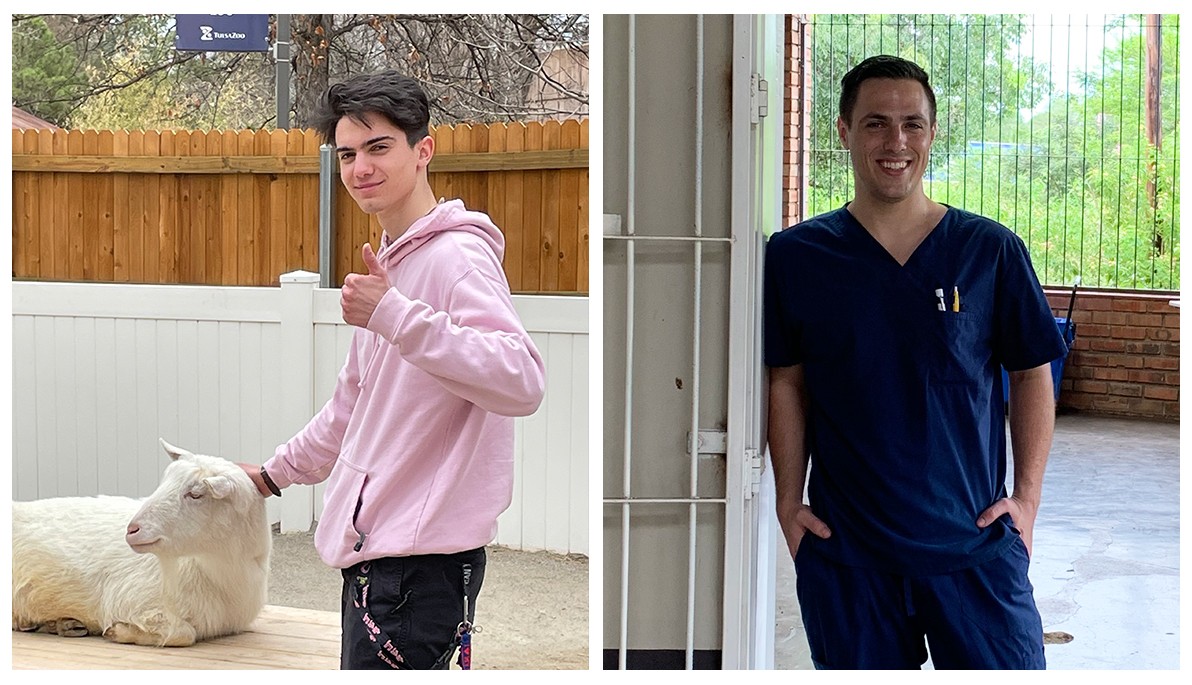
Guiliano Global Fellows: From the Midwest Plains to the African Savanna
May 8, 2023
Pictured: Amadeaus Reeves, left, and Nathanael Rehmeyer visited Oklahoma and Eswatini, respectively, as the latest participants in the Edward Guiliano Global Fellowship Program.
Since 2014, the Edward Guiliano Global Fellowship Program has awarded more than 170 New York Tech students the opportunity to engage in experiential-based learning opportunities that merge academics and culture. This March, two students, Amadeaus Reeves and Nathanael Rehmeyer, became the most recent recipients to complete their fellowship research projects, one in the great plains of Oklahoma and the other in the subtropical grassland savanna in Eswatini (formerly known as Swaziland), respectively.
These enriching, transformational experiences that the fellowship program enables must take place at least 200 miles from students’ homes or the university’s campus. Reeves, a computer science student, spent one week exploring Northeastern Oklahoma, where he pursued his project, “Research Design for a Virtual Reality (VR) Petting Zoo.” College of Osteopathic Medicine (NYITCOM) student Rehmeyer traveled to the village of Maphiveni, where he worked for nearly a month and a half at a clinic for his project, “Evaluation of Prevalence of Depression in Adolescents with HIV/AIDS in a rural clinic in Eswatini.”
Empathy and Humility
Rehmeyer states Eswatini has the highest HIV prevalence rate in the world—32 percent among adults aged 18 to 49 years old—and is a nation with minimal to no health services or recognition of the poor health outcomes associated with mental illness. With the help of a local leader who could translate English to the local language, SiSwati, Rehmeyer used an adapted Patient Health Questionnaire—the PHQ-2 and the PHQ-9—from the American Psychological Association to evaluate the prevalence of depression in HIV/AIDS-infected adolescents.
With his goal to assess the effect a positive HIV diagnosis has on a young person’s mental health and better equip the local clinic with the appropriate support, Rehmeyer surveyed nearly 30 teenagers, igniting “many intense and emotional conversations about mental health,” he says. The medical student experienced a transformative connection with the adolescents, and with his newfound data on the connection between an HIV/AIDS diagnosis and mental health, Rehmeyer hopes his increased understanding of these relationships can allow for more effective programming in altering the lives of severely underserved communities and societies globally.
“I cannot place enough value on the importance of collaboration and strategizing among healthcare providers on how to provide the right medication, follow-up, and continuity when all three are limited in these communities,” he says. “Approaching these differences with empathy and humility is a tool I will take with me for the rest of my life.”
Creating a Calm and Docile Environment
Traveling throughout Oklahoma’s plains, Reeves researched how animals behave in the wild and in captivity, common designs and layouts of petting zoos, and the landscape of the state’s natural grasslands. One stop was the Woolaroc Museum and Wildlife Preserve in Bartlesville. Here, Reeves learned about the history of the land and its transition to agricultural and oil drilling use and discovered some of Oklahoma’s land is federally protected due to previous overuse of its natural resources.
Trips to the Tulsa Zoo and the Joseph H. Williams Tallgrass Prairie Preserve in Pawhuska exposed Reeves to different living conditions of animals. He observed that the zoo had open areas specifically designed on flat ground to minimize the amount of stimulus an animal received, therefore making it more likely for them to remain docile with children. At the preserve, Reeves viewed unobstructed countryside where bison roam free.
“This VR petting zoo will be the first of its kind,” says Reeves of the project he hopes to soon bring to life. “This experience is designed with the intent of helping those with special needs enjoy a calm and docile zoo environment where they can feel safe.”
Students are selected for the Edward Guiliano Global Fellowship Program based on their applications, including the following metrics: Their project’s purpose, goals, and methods; creativity; transformative potential; intended effect; and budget proposal.
The next cycle of students participating in the Edward Guiliano Global Fellowship Program will complete their travel and projects between May and December 2023.
More Features

An Alumnus’ Commitment to the Environment
As an energy management graduate from New York Tech’s Vancouver campus, Jasdeep Gulati (M.S. ’22) is highly invested in educating people about environmental and climate sustainability.

Vancouver Faculty Win University-Sponsored Research Awards in New Program
The new Global Impact Research Grant (GIRG) program has been developed to keep Vancouver-based faculty connected to faculty and research projects being conducted on the university’s New York campuses.

Studying Climate Change One Degree at a Time
Junhua Qu (M.S. ’24) began her collegiate journey in Beijing. But, her interest in climate change took her to New York Tech’s Vancouver campus to study energy management.
